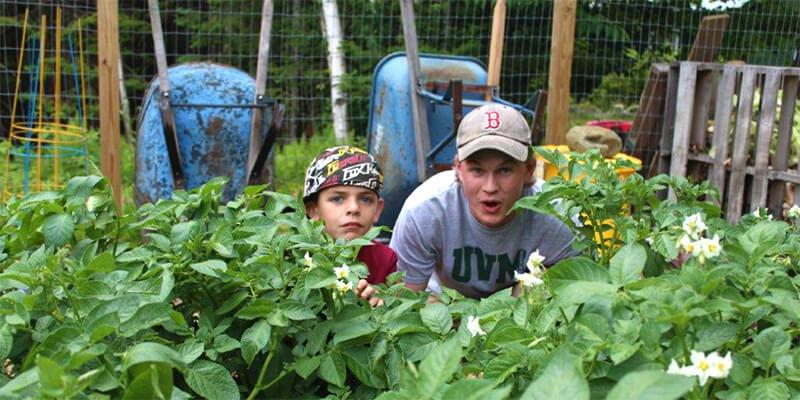I have been involved with Copper Cannon Camp for a little over five years now and have kept coming back because of how strongly I believe in the mission that is being carried out there. As someone who has grown up in summer camps I know the positive impact a well-run summer camp program can have in the life of a child. This is why I was very excited when I received the offer to serve the camp as the Nature Director and to develop a strong environmental education program during summer 2016.
Copper Cannon Camp is a rustic summer camp situated in the scenic White Mountain range located in northern New Hampshire. For many, the concept of summer camp brings to mind hot sunny days, afternoons splashing in the lake with new friends, and evenings illuminated by campfires with the occasional outburst of song. For those that were fortunate enough to attend summer camp in their childhood, many would agree that camp is where some of the best friends and memories are made.
However, as times have changed so too has the cost required to attend camp and it has become something that is financially unattainable for children who occupy the lowest tier of socio-economic classes within the United States. This is where Copper Cannon Camp steps in; since 1963, Copper Cannon has been dedicated to providing free summer camp programs to under-privileged youth in the state of New Hampshire. Copper Cannon Camp provides a week long, overnight camp experience to groups of children ranging in size from 60 to 80 campers per week. This free summer camp focuses on providing holistic experiences centered on personal growth, the creation of friendships, and developing a stronger appreciation of the environment.
The original goal behind my program, as well as one of my learning objectives, was for the kids to learn about the environment and to develop a deeper appreciation for it. I wanted to do this while still maintaining the “fun” of camp. I very much believe that learning still can take place out of the classroom, and it does not have to feel like a class or a lecture. To accomplish this, I developed an extensive curriculum consisting of games, exploration activities and guided hikes with each lesson centered on a different topic. Some of the topics that were covered included: predator-prey relationships, camouflage, resource competition, and how glaciers shaped our local area.
The second responsibility of my position was to maintain and supervise a raised bed organic garden that consisted of 32 beds. All of this was done underneath the direction of a volunteer Master Gardener named Russ Gaitskill. The goal behind the garden program was to, first, provide the camp kitchen with a continual supply of fresh organic produce and, second, to serve as a learning tool for the campers. By allowing the campers to pick, water, plant and maintain the things grown in the garden, they received a hands-on education on food production, resource/nutrient management concepts and strategies. This helped them to develop a better understanding of where their food comes from. The hope was that this program instilled a love for gardening and healthy foods within the campers which would then have a positive impact on their health in the future.
The last responsibility of my position was to serve as an administrative staff for the camp. In this role I wore many hats and took on many different responsibilities. Some of those responsibilities included but were not limited to: the training of camp staff, staff management and the carrying out of performance check-ins; camper behavior management; site-specific risk management; becoming a toilet plunger extraordinaire; and the professional critiquing of campfire s’mores. It is easy to see that some roles were more comical than others; however, the main point to be gathered is that I filled in where ever was necessary to help my staff provide our campers with an exciting and safe week of summer camp.
At the beginning of my internship experience I cannot confidently say that I fully knew what I would be getting myself into. I never realized how much work truly goes into all of the aspects that keeps a summer camp up and running. The combination of my program curriculum development and implementation, garden management and administrative work that I carried out was incredibly hard and tiring to balance. With that being said, I wouldn’t change any of it. I discovered a passion for sharing the natural world with others, and the fact that I have a pretty decent green thumb.
Through my management position I also learned that taking a higher leadership role in an organization is something that I enjoyed and I believe I did well in, however I also think there is so much more left for me to learn and improve on which is something I am very excited about. I believe that the experiences I had this summer have played a very substantial role in shaping me both personally and professionally. If I could offer any advice to future interns, it would be to find an internship involving something you enjoy and to remember to have fun with whatever you may choose. It is important that you’ll be able to look back on your internship experience knowing that you learned something and enjoyed your time while you were there because a positive experience could help you make more confident decisions for your future upon leaving college.
